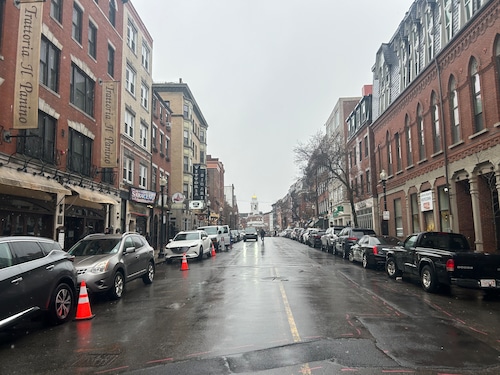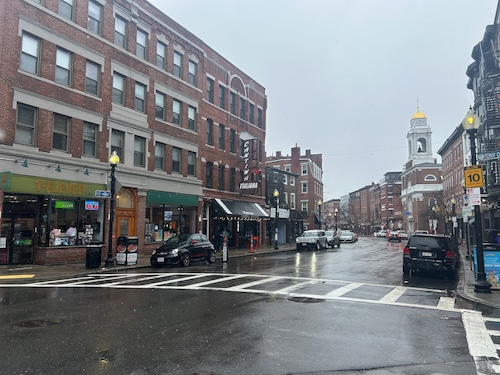Under the hot suns of summers past, Boston’s North End streets literally gushed with life.
Rows of visitors and residents sat at patio tables arranged on the pavement’s emptied parking spaces and sidewalks, shaded into makeshift cafes by flowers and greenery.
They ate heaping plates of authentic Italian pasta, sipped bona fide Negronis, and enjoyed the warm, light outdoor atmosphere.
“We all did our best to make it look great, and everybody had a beautiful patio. And people were so happy,” Damien DiPaola, the owner of Carmelina’s and other North End restaurants, recalled to MassLive.

The intersection of Hanover and Cross streets in the North End, a heavily trafficked area of the neighborhood. Photo by David CifarelliDavid Cifarellli
But that al fresco option won’t be offered by most North End restaurants this season.
Last year, Boston city officials decided against allowing on-street outdoor dining for the neighborhood, ruling the North End’s streets were too dense or poorly maintained for patios.
Officials also said some restaurants didn’t comply with hours of operation rules and questioned whether the extra foot traffic made for sanitation problems.
In January, 21 restaurant owners filed a lawsuit against the city over the ban, arguing they’re being singled out in murky logic by Mayor Michelle Wu.
The suit, filed in U.S. District Court, claims that some of the issues cited by Wu’s office are false accusations, while others are simply not unique to the neighborhood. It names the City of Boston as defendant.
The restaurant owners are seeking millions of dollars in monetary damages for revenue losses in 2023 and 2024, and restitution of fees they paid to the city to allow the dining option in 2022, amongst other compensations, as relief from a judge.

The intersection of Richmond/Parmenter and Hanover streets in the North End. Photo by David CifarelliDavid Cifarellli
Jorge Mendoza-Iturralde, co-owner of Vinoteca di Monica, and a plaintiff in the lawsuit, has called Wu too “inexperienced” and feels she’s been indifferent to Little Italy’s cultural significance.
He and Carla Gomes, owner of Terramia and Antico Forno, have been the public face of the restaurateurs’ suit.
Despite their best efforts, the restaurant owners say Wu has resisted their entreaties to talk.
Two invitations from North End business owners went unanswered by Wu and her offices last month to discuss the ban.
Wu has previously said she will not publicly discuss possible solutions in light of the pending litigation.
The mayor did not directly respond to MassLive’s requests for comment.
Wu’s office did provide an audio recording of the Democratic mayor answering a press question in March about outdoor dining in the North End, along with a February letter to the neighborhood task force from her chief of economic opportunity and inclusion, Segun Idowu.

The front of Vinoteca di Monica, owned by Jorge Mendoza-Iturralde, one of the restaurateurs in the lawsuit. Photo by David CifarelliDavid Cifarellli
This week, Wu’s office, through attorney Samantha Fuchs, filed a motion was to dismiss the suit, The Boston Herald reported.
Fuchs said the group’s argument is lacking and misguided, and that the city’s stipulations are “economic policies addressing the unique realities of a geographic area,” while the the North End’s perspective is an “unduly granular view.”
Regardless of the case’s outcome, the lines appear to have been drawn between the Bostonians without an easy resolution in sight.
Here’s what led up to the lawsuit, and each side’s argument.
2020-2021
After the pandemic halted restaurants’ indoor dining services for months, former Gov. Charlie Baker issued an executive order to re-open all restaurants with “outdoor table service” starting June 8, 2020.
The former governor’s advisory ordered all neighborhoods’ restaurants have a 6-foot distance between other tables and high foot traffic areas, among other licensing, social distancing, cleanliness and safety protocols.
Former Boston Mayor Marty Walsh’s advisory on the order said all neighborhoods’ restaurants patios should have a 6-foot distance between other tables and high foot traffic areas, amongst other licensing, social distancing, cleanliness and safety protocols.

Part of North Street in the North End, which runs adjacent to Hanover Street. Photo by David CifarelliDavid Cifarellli
Besides breathing some life back into society, the former governor’s order saved restaurateurs’ livelihoods — those in the North End included, the owners said.
The pilot program continued citywide into 2021 “with outstanding success,” the lawsuit alleged. It said former Mayor Martin Walsh’s plan “recognized each neighborhood had its own opportunities and challenges for outdoor dining,” until a new plan was initiated following Wu’s election in November 2021.
2022
The “North End 2022 Temporary Outdoor Dining Program,” by Wu’s office imposed “impact fees” on the neighborhood.
The North End was the only neighborhood required to pay for participation, a distinction that has not gone unnoticed by the restaurateurs.
The restaurateurs’ January lawsuit asserted owners paid “a $7,500 impact fee, and monthly fees of $480 for each parking space used by their patios.”
Payments began in $1,500 increments, to be made with “either a check (made payable to the City of Boston) or a credit card to City Hall Room 715,” according to the Boston.gov webpage.

Outside of Trattoria Ristorante (left) on Hanover Street in the North End. Photo by David CifarelliDavid Cifarellli
“For the 2022 outdoor dining season, participating North End restaurants agreed to pay a fee to help offset the City’s expenses due to the unique impacts outdoor dining has on the neighborhood,” the city’s site reads.
“The City created an outdoor dining committee made up of both residents and local business owners to advise on how funds collected from the fee should be spent,” it continued.
“To date, the City has collected about $300,000 from businesses participating in the program. All money collected from restaurant owners has been spent on the North End neighborhood,” the city website concluded.
That section sits to a table showcasing costs of public works like sweeping, maintenance and power washing, public safety and transportation. The suit asserts these were amongst many other services the city promised it would provide to the neighborhood with the fees paid by the owners.
This decision was announced on March 18, 2022, in a mandatory meeting hosted by the city, two weeks before outdoor dining was slated to open for the season. The lawsuit alleges the terms were decided a month earlier.

The sidewalk on Richmond Street in the North End. Photo by David CifarelliDavid Cifarellli
On March 20, 2022, two days after the announcement, an “internal email” from the city read, “If they sue, can we just say ‘fine, we are shutting down the North End program,’” according to the lawsuit.
A comment that Wu made the next day at the St. Patrick’s Day breakfast was also taken personally by the owners, the lawsuit asserted.
Wu had referred to “problems that are expensive, disruptive and white,” and elaborated she was referring to “snowflakes” and “snowstorms,” but the owners did not believe her, the suit reads.
They viewed it as yet another discriminatory stab from the mayor after Columbus Day was replaced by Indigenous Peoples’ Day in the city, which some in the neighborhood felt was an attack on Italian culture.
Mayor Wu’s letter on March 25, 2022
Following the owners’ outcries in opposition of the fees and terms, and a petition garnering over 37,500 signatures, Wu’s office sent a letter to the owners on March 25, 2022.
“If a critical mass of restaurant owners also believe this program is unworkable as proposed, then I am prepared to rescind North End outdoor dining before the start of the season,” Wu’s office wrote, according to the lawsuit.
Wu cited “unique impacts of outdoor dining on the quality of residential life.”

A sidewalk crack in the North End, one of the issues cited by city officials in their ban on on-street outdoor dining and an issue restaurant owners say is the city’s responsibility. Photo by David CifarelliDavid Cifarellli
She said the North End had “more than three times the number of on-street restaurants than the next highest neighborhood,” the “greatest loss of parking lots” and “more 311 and constituent service complaints related to noise, congestion, rodents, and street cleanliness from outdoor dining than anywhere else.”
“Since most restaurants in the North End are Italian restaurants, the [c]ity was aware that its draconian measures would adversely impact one ethnic group — Italian Americans,” the lawsuit read.
Restaurateurs’ response and 2023
The owners said they took it upon themselves to research the mayor’s points of contention, responding to each with data gleaned from public information requests and their own arguments.
The owners argued the 140 complaints about outdoor dining of the 274,000 total made through the city’s 311 call service in 2021 were “largely proportional to the number of restaurants in the neighborhood.”
Of those calls, the suit highlighted that 41 were for the North End and 39 were for South Boston, which had 40 less restaurants with outdoor dining than Little Italy. The city then classified those 41 calls into 16 topics, including layout or dimensions of outdoor patio, COVID guidelines and the like.

Antico Forno restaurant, owned by Carla Gomes, one of the restauranteurs in the lawsuit. Photo by David CifarelliDavid Cifarellli
“Mayor Wu’s second reason specifically focused on 311 complaints pertaining to four issues: noise, congestion, rodents, and street cleanliness. But there were no 311 complaints about congestion, rodents, and street cleanliness,” the suit read.
The suit argued the calls across all the neighborhoods were the same complaints the mayor pinned singularly on the North End — in the same way the mayor took issue with parking space loss — and alleged many calls were from people who opposed the entire concept of outdoor dining.
As for trash build-up, rodent control, and sidewalk safety (issues the suit reiterates is not unique to the North End), the owners argued those responsibilities are on the city — and that the fees they paid, promised to be spent on those services in the neighborhood, were not.

Trash build-up near the North Square on April 4, an issue the city cited as a problem that comes with outdoor dining in the North End but what restaurateurs say is the city’s responsibility. Photo by David CifarelliDavid Cifarellli
“The money we gave was supposed to do this… we didn’t have a police presence, they said that they will power wash and not once — the one time they sent a power washer to North Square, they videoed it,” said DiPaola, adding he and fellow restaurateurs maintain their own sidewalks.
Additionally, owner Gomes has repeatedly highlighted another point in the suit: a $552,000 electric street sweeper bought with some of the owners’ money in 2022 that was unrelated to the North End program’s requirements, and has been used across the city.
Finally, the suit called the mayor’s first statement on the neighborhood’s number of restaurants false. The suit cited public records of the top four restaurants with on-street outdoor dining in 2021 were the North End with 70, then Downtown Boston with 62, the Back Bay with 37 and South Boston with 30.

Terramia restaurant, owned by Carla Gomes, one of the restauranteurs in the lawsuit.Photo by David CifarelliDavid Cifarellli
“In contrast, every other participating restaurant in Boston paid no impact fee, paid no monthly parking fees, and enjoyed an eight- to nine-month outdoor dining season,” the lawsuit reads.
2023
On-street outdoor dining was not allowed in the North End for the 2023 season.
The suit cited Wu’s prior arguments, along with high tensions from media backlash, and the previous lawsuit filed by a smaller group over the ban at the time, which was later dropped.
Owners also said city officials “employed a highly irregular process” to decide the 2023 season.
The owners said officials were communicating with the North End Waterfront Residents Alliance with “favored treatment and extraordinary access” to make decisions for the restaurateurs in private calls and meetings up until February 2023.
The group had previously “openly opposed the North End restaurants and pressed for the ban,” the suit read.
The restaurateurs said Wu purposely took them by surprise when announcing the ban.
They also took issue with how the city established the “North End On-Street Outdoor Dining Task Force” with members who vehemently opposed outdoor dining as a whole to ensure “that meetings would be divisive” and unproductive.

Part of the heavily-trafficked Hanover Street in the North End. Photo by David CifarelliDavid Cifarellli
The Task Force went “dormant” after its final meeting in October 2023, the suit read.
After the current lawsuit was filed on Jan. 9, the owners said the city called for an unscheduled meeting of the task force on 24 hours’ notice, then prepared a summary of the task force’s findings itself and tried to have them “rubber stamp them.”
The members disagreed, the suit reads, but the city reinstated the 2024 ban nonetheless.
The aforementioned letter from February 2024 provided by Wu’s office to MassLive in response to request for the mayor’s comment, was addressed to the task force.
It announced the continuation of 2023′s ban into 2024. It also addressed past conversations held “for many months” and some suggestions that “emerged” for a “North End specific program” in the future, such as weekend-only outdoor dining or lottery systems.
The restaurauteurs’ suit was amended in March to demand the millions of dollars in monetary damages for compensation.
“Now, fewer diners and tourists frequent the North End due to the ban, and other non-restaurant businesses in the North End have lost revenue, too,” the lawsuit reads.
What’s Next?
As they wait for a judge’s order and another draining summer, the restaurateurs say they’re looking forward to a fair legal battle where the city will have no choice but to hear their side — and hopefully, listen.
“My hope is that we can have this argument in court, that our team can be very articulate about the reasons we are complaining about this, and why we feel we’re being completely… whatever you want to call it; shafted, discriminated against… excluded from the economy,” Mendoza-Iturralde told MassLive.

The front of Carmelina’s, owned by Damien DiPaola, one of the restaurants involved in the lawsuit. Photo by David CifarelliDavid Cifarellli
They point to the neighborhood’s unique character and history that mirrors Italy.
“[Italian neighborhoods have] all these enclaves where they have their bakeries, their butchers, their traditions,” DiPaola said.
“And then when you have the outdoor seating… it’s, ‘Oh my God, this reminds me of Italy,’” he said of his North End visitors’ commentary, elaborating how his patrons coming from both locally and far say Boston’s sect stands well above the rest of the country’s Italian neighborhoods.
Mayor Wu’s attorney’s statement to dismiss the charges reported on April 9 read, “Greater sanitation needs are an inevitable consequence of increased outdoor dining in public ways, particularly in the North End, where more than 60 restaurants offered outdoor dining in less than one-third of a square mile.”

Garden Court Street in the North End. Photo by David CifarelliDavid Cifarellli
Fuchs said the neighborhood has the densest concentration of restaurants in the state, with 95 in a third of a square mile, the outlet reported.
“The restaurants ignore the forest for the trees,” she wrote, according to the Herald.
“The distinction the City has drawn is based on the neighborhood and its characteristics, and the reality that the operation of restaurants within the public right of way presents different challenges and impacts based on a particular neighborhood,” Fuchs’ statement read.
“As long of the city of Boston is still in the United States of America — ” said Anne Altieri, Mendoza-Iturralde’s wife, before he jumped in.
” — we’re going to fight,” Mendoza-Iturralde said. Altieri finished her sentence, “… there’s hope.”






